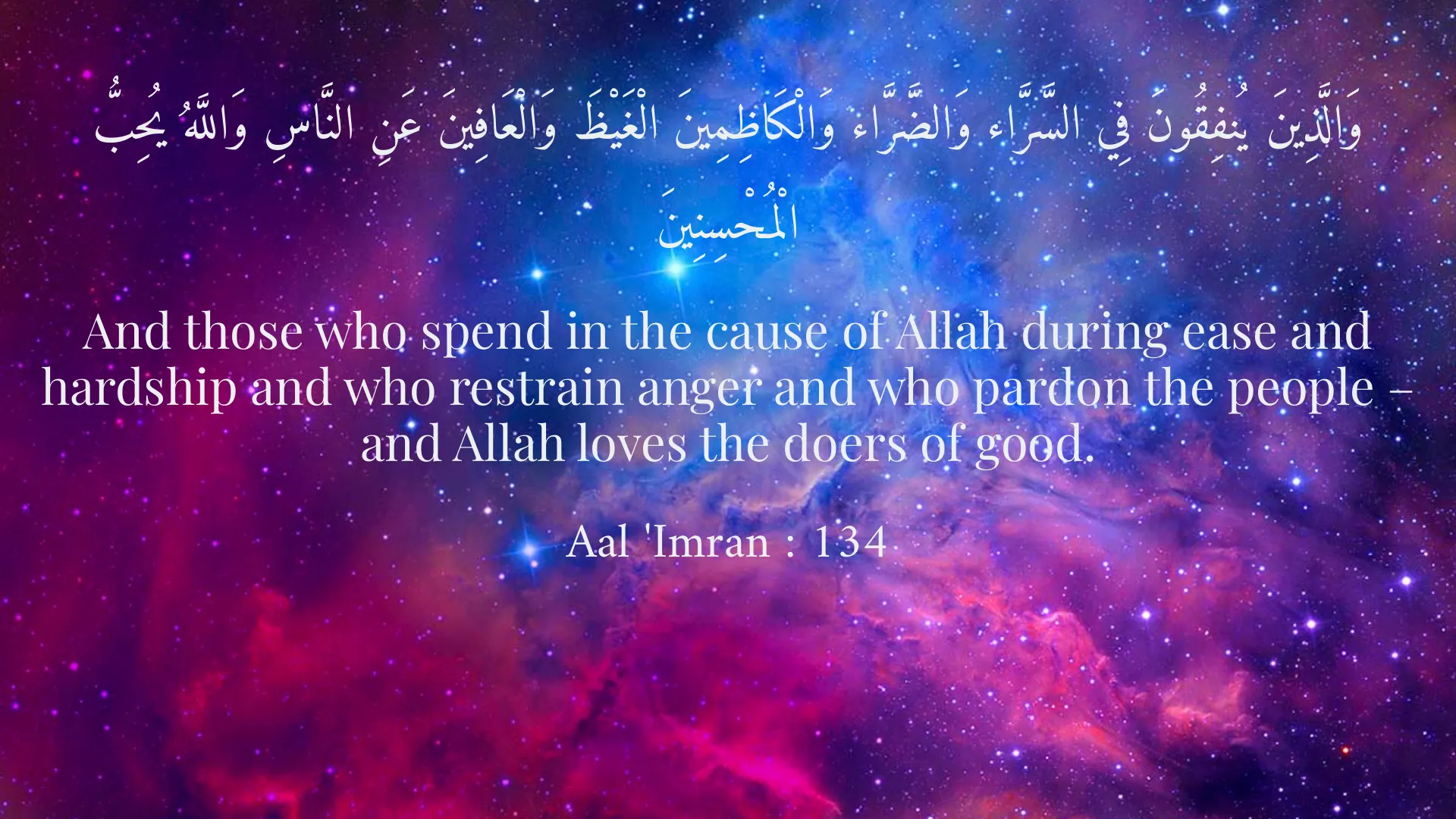Quranic Answer

The Holy Quran, the central religious text of Islam, presents a profound exploration of the concepts of love and forgiveness, which are integral to the fabric of a harmonious society. These fundamental traits are emphasized multiple times throughout Quranic verses, urging believers to internalize them and embody them in their daily lives. The essence of love and forgiveness is not merely limited to interpersonal relationships but is rooted deeply within the framework of human existence and divine commandments, serving as a guiding principle for the conduct of every individual. In Surah Aal-'Imran, verse 134, the Quran proclaims: 'And those who spend in the cause of Allah during ease and hardship and who restrain anger and who pardon the people – and Allah loves the doers of good.' This powerful verse encapsulates the essence of forgiveness by illustrating how it is intertwined with the act of charity, patience, and emotional control. The phrase ‘restrain anger’ underscores the importance of self-restraint in the face of provocation, portraying it as a virtue that is rewarded by God. The act of forgiving others is portrayed as a quality possessed by the righteous and a trait that draws the love of Allah. Forgiveness in the Quran is not presented as an act of weakness but rather a profound manifestation of strength. It requires immense courage to forgive those who have wronged us, and this quality is highly revered in Islamic teachings. The Quran consistently identifies love and forgiveness as essential components of faith, which goes beyond religious rituals and into the very essence of a believer’s interactions with fellow human beings. Moreover, Surah An-Nur further cements this philosophy by encouraging believers to treat one another with kindness and to forgive each other especially during difficult times such as family disputes or social disagreements. Such teachings foster a culture of mutual respect and understanding, emphasizing that conflicts can be resolved through compassion rather than animosity. The act of forgiving is highlighted as a means of cultivating a community that thrives on peace and understanding. The Quran teaches that a society marked by love and forgiveness can withstand trials and tribulations much more effectively than one characterized by resentment and hostility. The importance of these qualities extends beyond mere interpersonal relationships; they also influence collective community sentiments and the moral fabric of society. Believers are called to exhibit love not only toward those close to them, such as family members but also to humanity at large. This notion transcends cultural, racial, and social barriers, promoting an inclusive approach to love and forgiveness. The embodiment of these traits contributes significantly to creating an environment where individuals feel safe, valued, and respected, and where conflict is minimized. In Surah Al-Ma'idah, verse 32, the Quran underscores the sanctity of human life, thereby reinforcing the importance of love as a unifying force: 'Because of that, We decreed upon the Children of Israel that whoever kills a soul unless for a soul or for corruption [done] in the land – it is as if he had slain mankind entirely.' This verse illustrates the critical nature of preserving human life and suggests that any act leading to violence or division is an affront not only to individuals but to humanity itself. The Quran's teachings signify that love should extend beyond one's immediate circle and should encompass all of mankind. This universal approach to love aligns with the core Islamic belief that every individual is created by God and thus holds value and dignity. It is in this understanding that Muslims are encouraged to foster a spirit of love, transcending barriers of race, nationality, and religion, and acting as stewards of peace in their communities. In conclusion, the Holy Quran profoundly emphasizes the significance of love and forgiveness as foundational traits for personal development and social cohesion. These qualities are vital in nurturing relationships, fostering unity, and creating a community that is devoid of tension and conflict. Through love and forgiveness, individuals learn to cultivate empathy and compassion, allowing for the healing of relationships and the reinforcement of community bonds. In a world often rife with discord and misunderstanding, the Quran's teachings resonate as a timeless reminder of the power of love and the strength found in forgiveness, guiding humanity toward a path of peace and mutual respect. By embracing these ideals, believers are called not only to uplift themselves but also to contribute positively to the lives of others, working collectively toward a more compassionate and understanding world.
Related Verses
وَالَّذِينَ يُنفِقُونَ فِي السَّرَّاء وَالضَّرَّاء وَالْكَاظِمِينَ الْغَيْظَ وَالْعَافِينَ عَنِ النَّاسِ وَاللَّهُ يُحِبُّ الْمُحْسِنِينَ
And those who spend in the cause of Allah during ease and hardship and who restrain anger and who pardon the people – and Allah loves the doers of good.
Aal 'Imran : 134
مَن قَتَلَ نَفْسًا بِغَيْرِ نَفْسٍ أَوْ فَسَادٍ فِي الْأَرْضِ فَكأنَّمَا قَتَلَ النَّاسَ جَمِيعًا
Because of that, We decreed upon the Children of Israel that whoever kills a soul unless for a soul or for corruption [done] in the land – it is as if he had slain mankind entirely.
Al-Ma'idah : 32
وَلَا يَأْتَلِ أُو۟لُو الْفَضْلِ مِنكُمْ وَالسَّعَةِ أَن يُؤَتُوا أُو۟لِي الْقُرْبَى وَالْمَسَاكِينِ وَالْمُهَاجِرِينَ فِي سَبِيلِ اللَّهِ وَالْيَعْفُو عَن الْأَخطاءَ
And let not those of virtue among you and wealth swear not to give to their relatives and the needy and the immigrants in the cause of Allah. And let them pardon and overlook.
An-Nur : 22
Short Story
One day, Adel was feeling upset for various reasons, and he pondered how he could let go of these feelings. He decided to refer to the Quran. By reading the verses of love and forgiveness, he realized how he could transform these feelings into love. He then forgave a friend who had hurt him, which made him feel much lighter. His life filled with love and kindness became full of satisfaction and peace.